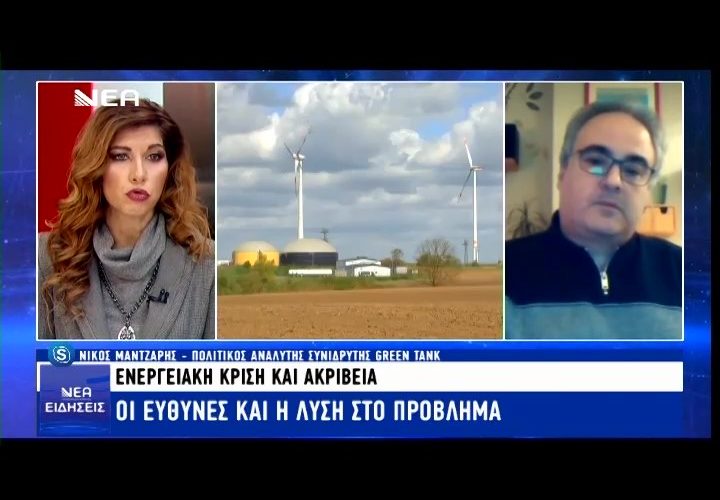Interview by Nikos Mantzaris to Eyaggelia Xirouchaki and the Cretan TV channel NEA TV on the energy crisis and soaring prices.
As the Russian invasion of Ukraine is still underway, Nikos Mantzaris stressed that the state of emergency in energy, which had been noted already in the previous months, was significantly aggravated due to the war. However, emergency response measures to be adopted should not undermine the EU’s long-term climate targets. The return to renewables is the long-term normality, he pointed out.
In this direction – and contrary to views advocating the return to lignite or the creation of new fossil gas infrastructure – the proposals considered by the relevant European institutions are mainly:
- Solar panels on the roofs.
- Acceleration of RES deployment and new grids.
- Decarbonisation of industry through electrification and the use of green hydrogen.
- Doubling of the production of renewable biomethane.
- Increase in production and imports of green hydrogen.
- And as long as we still need fossil gas, diversification of source countries.
As he explained, renewable energy, energy storage and energy savings are not only the long-term sustainable – in climate terms – solutions, but also the cheapest. It is estimated that, under these measures, the EU will reduce its dependence on Russian gas by 2/3 by the end of the year, which in quantitative terms means a reduction in gas imports from Russia of about 100 billion cubic meters. This will a be a strike against Russia as well, since more than half of Russia’s exports, worth around 240 billion a year, are in fossil fuels. The EU receives 3/4 of Russia’s gas exports, approx. 50% in oil and approx. 1/3 in coal. So by cutting the cord with fossil fuel imports from Russia, we deprive the country of very important economic resources that finance the war.
As a result, as he pointed out during the interview, we do not only shield ourselves against the energy price crisis, but we also support the people of Ukraine by promoting peace in practice.
The interview was broadcast live on Saturday 12/03/2022. It is available (in Greek) here:



















































































































































































































































































































